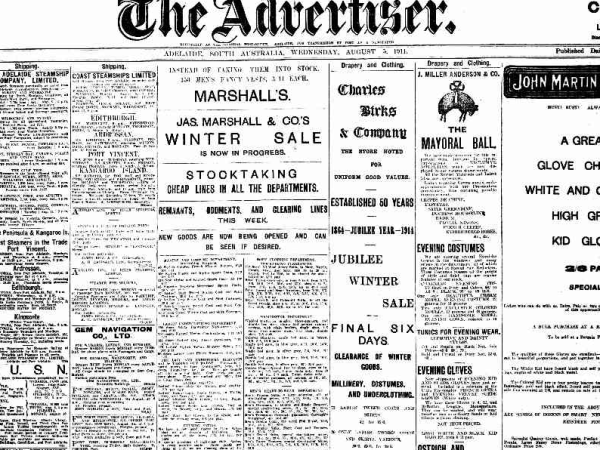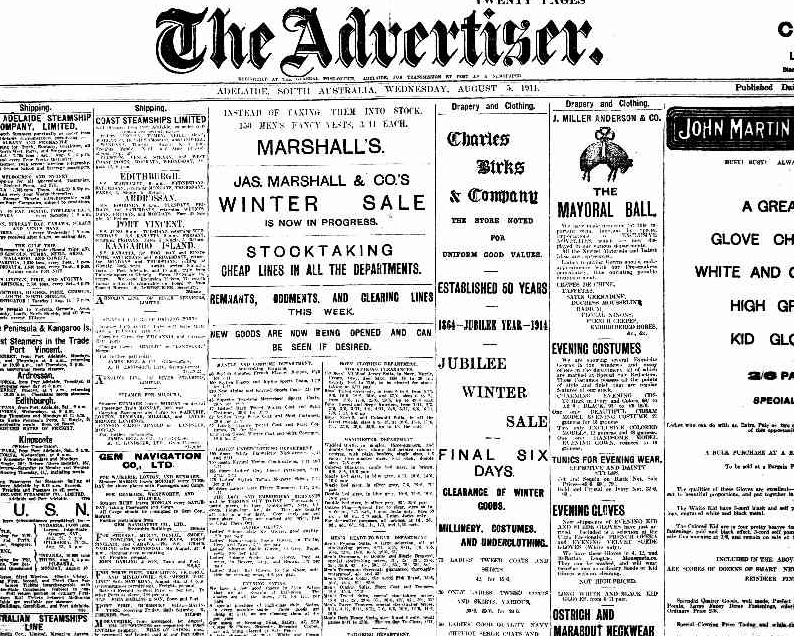Advertiser – September 1916
Friday 1 Sept p8
Men and Women of All-British stock are advised that the Premier will receive a deputation… on Saturday 2nd September…
A petition signed by about 50,000 Residents of South Australia will be presented to him, praying for the Disenfranchisement of enemy subjects, removal of Germans from the rolls of Justices of the Peace, the ousting of Germans from public positions and the closing of German Schools…
Wed 6 Sept p 6
A GENEROUS GIFT
Mrs Harry Bickford, of Mount Lofty, presented to the British War Office, through Lady Galway, an armed aeroplane, to be called the ‘Queen Adelaide’. She has also had a motor ambulance locally constructed, which it is her intention to hand over to the military authorities for service abroad.
Mon 11 Sept p9
LADIES IN SMOKING CARRIAGES
From ‘Smoker’ – In every railway smoking carriage we see a notice: ‘No person who has not paid a full adult fare shall travel in a smoking carriage’ Can anyone tell me why this rile is not enforced. Nearly every smoking carriage has several ladies and children scattered over the seats, while men who want a smoke have to stand and receive the black looks given them for being so rude as to smoke. Meanwhile the non-smoking carriages are empty, but woe betide anyone smoking in them!…
Fri 15 Sept p6
TREATMENT OF INSANITY
The report for 1915 of the Inspector General of Hospitals on the Parkside Mental Hospital and the certified mental defectives has more than one important feature… The statistics are rather more depressing than ordinarily, for the admissions… constitute the largest number ever recorded for any one year… The War and its worries are held answerable for ten cases, and it is noteworthy that dementia and mania have distinctively increased… so universal has been the mental strain produced by the Armageddon… Of eight soldiers admitted last year four were discharged as recovered. Temporary disorganisation of the nervous structure, due to whatever cause, is a very different thing from its degeneration…
Dr Morris requests that the institution may be relieved of the presence of child patients under 18 years of age, of whom there are several… Also he thinks it time the practice was abandoned of sending the victims of senile decay to the mental hospital when they could equally well in other institutions, or even, in many cases, in their own homes.
Sat 16 Sept p9
MR VAUGHAN TAKES HIS STAND: A CONVERT TO CONSCRIPTION
When asked on Friday what action he intended to take with regard to the coming campaign for compulsory service, the Premier (Hon C Vaughan) stated: —
I am going right out to help Mr Highes carry the referendum. I stated at the great meeting that the Prime Minister held… when he returned from England that I would stand behind him in any action which he through necessary to safeguard this country. The Federal Government have decided that in order to fulfil out Imperial obligations compulsory service is imperative, and we should, in my opinion, accept that as final…
What was the attitude of the Labor conference towards the conscription question, the Premier was asked.
…The Conference declared itself in favour of the referendum but was opposed to the conscription of human life… I have myself been a lifelong opponent of compulsory service. But the question is not whether our ideals shall survive, but whether our national existence shall be preserved…
Mon 25 Sept p6
WORSE THAN GALLIPOLI.
“The last week has been the most trying one I have ever experienced. The landing at Gallipoli was a fool to it.” So declared Colonel Weir in a letter from which we published an extract on Friday last. That gallant officer left Australia nearly two years ago , in command of the first battalion of troops sent from this State. He was present at the magnificent fight on the shores of Anzac Cove on April 25, 1915, and since then he has been engaged with his troops in Egypt and France. The comparison quoted has reference to the earlier stages of the battle on the Somme, where the Australians distinguished themselves in the taking of Pozieres, and where more recently still the New Zealanders have shown up prominently in what General Haig has described as the most effective blow dealt by the British to the enemy during the present war. The Australians were, comparatively speaking, raw troops when they faced the desperate adventure of the Gallipoli landing, although they had previously undergone a strenuous training in Egypt. When they made their fiery charge up the slopes against the entrenched Turks “all the world wondered, “but an explanation of their fearless assault was found in the fact that they were specially adapted to that kind of fighting because of their outdoor habits and their sporting instincts.



